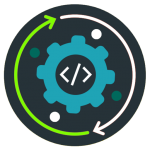DevOps engineers are in-demand skillful professionals in the dominant IT era who automate multiple processes throughout the entire software development lifecycle. If you want to be a successful DevOps engineer or hire one for your team, you are at the right place. Continue reading this article to learn about the main career objective for DevOps engineers.
The term DevOps is the combination of processes and tools that help companies deliver services and applications much faster than traditional software development processes. In simple words, DevOps is the combination of technology, process, and users that provide more value to customers.
Table of Contents
The term ‘DevOps’ is a portmanteau – a fancy word that blends two or more words to create a new word like motel and brunch. DevOps is the combination of development and operations, indicating that the tasks and operations performed by a company’s IT operations and app development teams are shared.
What is DevOps?
Generally, DevOps is a set of practices that bridge the gap between development, IT operations, and quality assurance. It ensures strong communication and collaboration between the three different teams.
DevOps aims to merge everyday tasks occurring in the development, deployment, QA, and software development into a single process. As a result, development cycles become shorter, and teams deliver more high-quality software in less time.
Responsibilities of a DevOps Engineer
Collaborating with diverse professionals should be the main career objective for DevOps engineers. They need to work with different departments to manage and implement software systems on the same page. The DevOps engineers are expert IT professionals who assist software developers, QA professionals, and IT staff in order to manage code releases.
As a DevOps engineer, you must multitask to ensure flexibility and deal with different situations simultaneously. If you want to be professional or hire one, here are a DevOps engineer’s responsibilities that you need to know:
Documentation
A DevOps engineer writes specifications and creates proper documentation for server-side features.
Systems Analysis
DevOps Engineer takes a look and analyzes the technology to develop improvement plans and processes. You also need to be responsible for assisting with urgent analytic needs.
Development
As a DevOps engineer, you will need to take part in the development tasks, including developing, coding, installing, building, configuring, and maintaining IT solutions.
Project Planning
DevOps engineers are responsible for participating in project planning meetings to discuss their understanding and analysis of system options, risks, impacts, implementation process, and costs vs. benefits. They also need to address development plans and operational requirements.
Testing
Another responsibility of a DevOps engineer is to test codes, processes, and deployments to make sure the process is streamlined and has minimum errors.
Deployment
A DevOps engineer in your team should be able to configure management software so that the updates and fixes run automatically, causing no delays in the production tasks.
Maintenance
Routine maintenance and troubleshooting enable DevOps engineers to ensure there is no production error and the process is running smoothly.
Overall Performance Management
A DevOps engineer is responsible for enhancing each team’s performance by analyzing gaps, identifying issues, and providing alternative solutions with effective modifications.
Team Management
In large organizations, the DevOps engineer needs to manage a team of DevOps engineers.
Career Objective of a DevOps Engineer
The IT sector is continuously growing with fast-paced technological advancements, creating more opportunities for DevOps engineers. Being a DevOps engineer, you need to set goals that help you face countless challenges to compete and succeed in the market. Here are some career objectives and principles that you need to consider when becoming a DevOps engineer or hiring one for your team:
Creating Strong Collaboration Between Teams
As mentioned above, DevOps is defined as the combination of development and operations; therefore, your most important objective should be to form an effective collaboration between teams. However, effective collaboration in any process comes with shared ownership.
So, each team member should understand that each of them is equally responsible for the entire development process. As a DevOps engineer, you should play a key role in creating shared ownership and forming collaboration.
Also Read: DevOps Job Interview Questions and Answers
Be it development, testing, or deployment; you should involve each team member in the process, making it more effective and valuable. Breaking down the tasks and passing them from one team to another in a completely defined way is considered the most important career objective for DevOps engineers. This streamlined collaboration expedites the entire development process.
Creating Scalable Infrastructure Platforms
With the advent of fast-paced technologies, the business world demands scalable apps. Therefore, your primary goal as a DevOps engineer is to create a highly scalable infrastructure for applications.
In an ideal situation, creating scalable infrastructure should be sustainable, reliable, and fully automated. This enables apps to operate in any situation after they are launched in the market. Today’s business world requires a scalable app because it can adjust itself to large traffic and offer an effective user experience.
Automated Release Management
With the rising trend of on-demand changes, organizations must focus on creating software in a releasable state. So, they expect DevOps engineers to ensure automatic release management in their applications. Continuous delivery will enable the software to bring new features for the audience and go live at any stage.
Being a DevOps engineer, you should be able to automate the release management process as it offers countless benefits for the company, users, and your competency. Automated release management is fast, consistent, and a requirement of the modern era. It allows organizations to launch new updates and versions as per the requirements.
Providing Faster Feedback Is an Important Career Objective for DevOps Engineer
Feedbacks ensure the quality of the product. In the case of development, feedback comes after testing and reporting. So, DevOps engineers utilize automating tasks to expedite the process of faster feedback.
The development team will not change updates unless they know what to change. Therefore, faster feedback is necessary to roll out the updated version. Not just that, but teams can better understand the impact of changes when the process of feedback is fast, accelerating the entire software development cycle.
With faster feedback, each team can make smart decisions collectively and improve the overall efficiency of the apps.
Benefits of DevOps
Organizations need DevOps because it helps them create automated software management, providing added value to their customers. Here are some of the benefits that compel organizations to hire DevOps engineers in their production team:
DevOps Engineers Ensure Smarter Work and Faster Release
With DevOps engineers in collaboration, development teams can release the required deliverables faster. Quick deliveries will allow organizations to stay ahead of competitors in the industry. The automated development cycle is necessary for businesses in the modern era. Companies need DevOps engineers’ assistance to fasten the release process and provide more deliverables in less time. Automated process with the faster release is an important career objective for DevOps Engineers.
Quick Resolution of Issues Is an Essential Career Objective for DevOps Engineer
In a modern business era where speed and quality are two important factors, quick feedback will allow organizations to improve development and quick delivery. DevOps engineers improve communication and ensure a seamless process, which resolves the occurring issues in minimum time.
The issues can be neglected and create serious repercussions in the long run when there is no proper communication between the teams. A DevOps engineer creates open communication, resolves issues, and releases apps faster.
Innovative Mindset of Developers
With DevOps, there is open communication between the teams, creating an effective environment for mutual collaboration. This eliminates departmental barriers and forms a sense of shared ownership. As a result, team members are more relaxed with such deployment phases as compared to traditional methods. The streamlined process leaves no lapses in quality and ensures efficient release.
This allows developers and the rest of the production team to think out of the box and work with an innovative mindset. An innovative approach offers additional value to the users, leading to better quality.
Increased customer satisfaction
Being a business person, customer satisfaction is necessary for your company’s image in the industry. Using DevOps may allow you to provide an enhanced customer experience, which also increases customer satisfaction levels. Happy and satisfied customers are always a good sign for any business. A DevOps engineer creates a feedback loop that tracks the progress of each software development in different stages.
Final Thoughts
DevOps engineers are currently in high demand. Companies that employ DevOps practices aim to automate their process, create high-functioning procedures, and satisfy customers with enhanced user experience.
To become a DevOps engineer or hire one, you must know the career objective for DevOps engineers. For instance, you must have appealing communication skills because you will be asked to communicate with the teams. A DevOps engineer bridges the gap between development, operations, and IT staff to ensure automated software development.
Let us know in the comments section below if we have missed any career objectives for DevOps Engineer.


Leave a Reply